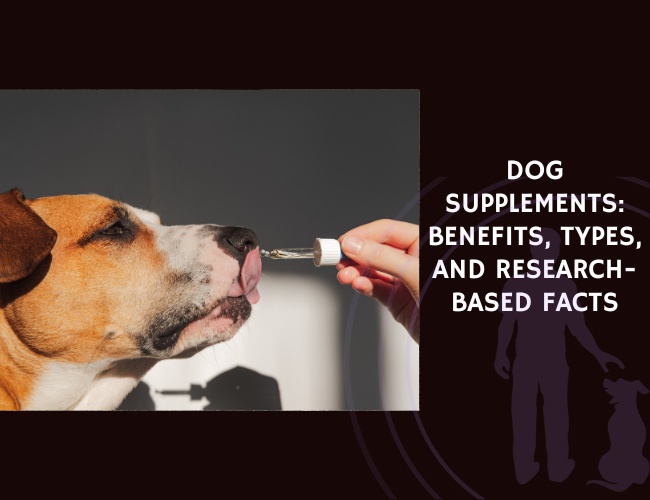Introduction to Dog Supplements
Definition and Purpose of Dog Supplements
tamDog supplements are products designed to enhance a dog’s diet, ensuring they receive all necessary nutrients to support overall health and well-being. These supplements are not intended to replace complete and balanced dog food but to address nutritional gaps, promote specific health benefits, and support overall vitality. By providing essential vitamins, minerals, amino acids and other nutrients, dog supplements help maintain physiological functions, support growth and development, and prevent potential deficiencies.
Different Forms of Supplements
Dog supplements come in various forms, each catering to different preferences and needs:
- Powders: Easily mixed with food or water, ideal for dogs that might avoid tablets.
- Tablets: Convenient for precise dosing and often chewable, suitable for treat-driven dogs.
- Chews: Flavored and soft, these are like treats, making them palatable and easy to administer.
- Liquids: Can be added to water or food, offering a versatile option for dogs that dislike solid forms.
Each form has its benefits, and the choice often depends on the dog’s preferences and the specific health needs being addressed.
Importance of Supplementation in Modern Dog Nutrition
Modern dog nutrition has evolved significantly, with an increasing understanding of canine health and dietary needs. Despite the availability of high-quality commercial dog foods, there are several reasons why supplementation might be necessary:
- Nutrient Loss During Processing: Commercial dog foods often lose vital nutrients during processing and storage. Supplements help replace these lost nutrients, ensuring a complete nutrient profile.
- Life Stage and Lifestyle Needs: Different life stages (puppies, adults, seniors) and activity levels require tailored nutrition. Supplements cater to these specific needs, such as joint support for seniors or growth boosters for puppies.
- Health Conditions: Certain health conditions may necessitate additional nutrients not provided by standard dog food. Supplements can address issues like skin allergies, digestive problems, or joint pain.
- Environmental Factors: Factors like stress, pollution, and other environmental conditions can increase the nutritional demands on a dog’s body. Supplements help mitigate these extrinsic factors by boosting immune support and overall resilience.
By integrating supplements into a dog’s diet, owners can provide targeted nutrition that supports optimal health, enhances quality of life, and potentially extends their pet’s lifespan.
As we explore the various types and benefits of dog supplements, it’s clear that their role in supporting modern dog nutrition is both vital and multifaceted. This foundation sets the stage for understanding the specific nutrients and their targeted benefits.
Types of Essential Dog Supplements
Overview of Vitamins and Minerals Supplements
Vitamins and minerals are pivotal for a dog’s overall health, supporting various bodily functions. Essential vitamins, such as A, B-complex, C, D, E, and K, play critical roles in eye health, immune system function, energy metabolism, bone health, and blood clotting.
Minerals, like calcium, phosphorus, magnesium, potassium, iron, and zinc, are equally important. They contribute to healthy bones and teeth, hormonal balance, and enabling muscle and nerve function. Ensuring dogs receive these nutrients is crucial, particularly when their diet may not supply all the necessary components.
Probiotics and Digestive Health Supplements
Probiotics are another vital group of supplements designed to maintain a healthy digestive system. These are beneficial bacteria that support the gut’s natural microflora balance, aiding digestion and enhancing nutrient absorption. They help manage digestive issues like diarrhea and irritable bowel syndrome and can boost the dog’s immune system resilience.
Like humans, dogs benefit from a stabilized digestive microbiome, which probiotics help establish. Common probiotic strains for dogs include Lactobacillus, Bifidobacterium, and Enterococcus, each contributing to a balanced, robust digestive system.
Omega Fatty Acids and Joint Health Supplements
Omega fatty acids, particularly omega-3 and omega-6, are essential for a dog’s joint health and overall well-being. These fatty acids help reduce inflammation, supporting joint mobility and alleviating symptoms of arthritis in senior dogs.
Omega-3 fatty acids, found in fish oil supplements, also benefit the skin and coat, making them shinier and reducing irritation and dryness. Beyond joint and skin health, these supplements promote cardiovascular health and cognitive function.
Joint health supplements often include glucosamine and chondroitin, which work synergistically with omega fatty acids to protect and repair cartilage, reducing pain and improving joint function. As dogs age, these supplements can become even more crucial in maintaining mobility and comfort.
These essential supplements—vitamins and minerals, probiotics, and omega fatty acids—are integral to a comprehensive nutrition plan, especially when addressing various life stages and specific health needs. As we move forward, understanding the importance of age-specific supplementation will further highlight the tailored approach necessary for a dog’s health journey.
Health Benefits and Applications
Joint Health Support through Glucosamine and Chondroitin
Glucosamine and chondroitin are two vital supplements for maintaining joint health in dogs, especially as they age. These compounds help in the formation and repair of cartilage. Reduced joint pain and enhanced mobility are significant benefits. Glucosamine is a natural compound often derived from shellfish, while chondroitin is usually sourced from animal cartilage.
Regular supplementation with glucosamine and chondroitin can help prevent or alleviate symptoms of arthritis, which is prevalent among senior dogs. It is especially beneficial for breeds prone to joint issues, such as German Shepherds and Labradors.
Digestive System Benefits from Probiotics
Probiotics play a crucial role in maintaining a healthy gut in dogs. These supplements consist of beneficial bacteria that improve the balance of gut flora, leading to better nutrient absorption and a robust immune system. Common probiotic strains include Lactobacillus and Bifidobacterium.
Introducing probiotics to a dog’s diet can help alleviate gastrointestinal issues like diarrhea, constipation, and irritable bowel syndrome. It can also reduce inflammation related to digestive problems and enhance overall gut health. Consistent usage of probiotics leads to better digestive regularity and can also improve a dog’s mood and energy levels.
Skin and Coat Improvement with Omega-3 Fatty Acids
Omega-3 fatty acids, particularly EPA (eicosapentaenoic acid) and DHA (docosahexaenoic acid), are indispensable for a dog’s skin and coat health. These essential fats, often derived from fish oil, flaxseed oil, or algae oil, provide anti-inflammatory benefits and help maintain healthy skin and a shiny coat.
Supplementing a dog’s diet with omega-3 fatty acids can support various conditions like dry skin, allergies, and dermatitis. These fatty acids help reduce itching and inflammation, promoting healthier skin and a lustrous coat. Additionally, omega-3 supplements can enhance heart and brain function, offering comprehensive health benefits.
Proper understanding and management of these supplements’ health benefits are essential for ensuring a dog’s well-being. Regular monitoring and consultation with a veterinarian can help in adjusting the supplement regimen for optimum results, leading to a healthier, happier pet.
Age-Specific Supplement Needs
Puppy-Specific Nutritional Requirements
Puppies require specific nutrients to ensure healthy growth and development. During the critical first year of life, they are building the foundation for a strong immune system, muscular development, and cognitive function. Essential supplements for puppies often include:
- DHA (docosahexaenoic acid) – an omega-3 fatty acid crucial for brain development and visual health.
- Calcium and Phosphorus – for strong bones and teeth; maintaining the correct ratio is vital to prevent skeletal issues.
- Probiotics – to support digestive health and nutrient absorption, which is especially important as puppies transition from mother’s milk to solid foods.
- Antioxidants – such as vitamins C and E, to bolster the developing immune system against infections and diseases.
Adult Dog Maintenance Supplements
Once dogs reach adulthood, their nutritional needs shift from growth to maintenance. While a balanced diet is often sufficient, certain supplements can help sustain their overall health and address specific concerns:
- Multivitamins – to fill any nutritional gaps in their diet and ensure balanced intake of essential vitamins and minerals.
- Omega-3 and Omega-6 Fatty Acids – to maintain skin, coat health, and support an anti-inflammatory response.
- Joint Supplements – containing glucosamine and chondroitin, which help maintain joint flexibility and comfort in active dogs.
- Probiotics – to continue supporting digestive health, especially in dogs with sensitive stomachs or dietary changes.
Senior Dog Joint and Cognitive Support
As dogs age, their bodies undergo changes that can benefit from targeted supplementation. Senior dogs often face joint issues and cognitive decline, making specific supplements essential for their quality of life:
- Glucosamine and Chondroitin – to support joint health, reduce pain, and improve mobility. These supplements help manage arthritis and other degenerative joint diseases.
- Omega-3 Fatty Acids – particularly DHA and EPA, which offer anti-inflammatory properties and support cognitive health, helping manage aging brain concerns.
- Antioxidants – such as Coenzyme Q10 and vitamins C and E, to combat oxidative stress and promote cellular health.
- L-Carnitine – an amino acid that supports cellular energy production and may aid in muscle maintenance and weight management in less active senior dogs.
Each life stage has distinct nutritional necessities. Tailoring supplementation ensures that puppies grow optimally, adult dogs remain healthy and active, and senior dogs enjoy comfort and vitality. Consulting with a veterinarian for personalized advice is essential.
Monitoring a dog’s response to supplements and adjusting as needed can maximize their benefits and overall health. Ensuring safe and effective supplementation practices is critical for any pet owner dedicated to their dog’s well-being.
Vet-Recommended Supplements for Dogs
When considering supplements for dogs, it’s essential to consult with a veterinarian to ensure the chosen products align with your pet’s specific health needs. Veterinarians often recommend supplements based on a dog’s age, breed, and existing health conditions. For instance, omega-3 fatty acids are frequently suggested for their anti-inflammatory properties, benefiting dogs with joint issues or skin conditions. Glucosamine and chondroitin are also popular vet-recommended supplements, particularly for older dogs or breeds prone to joint problems, as they support cartilage health and improve mobility.
Probiotics are another category of supplements that vets commonly endorse, especially for dogs experiencing digestive issues. These beneficial bacteria help maintain a balanced gut flora, enhancing nutrient absorption and boosting the immune system. Additionally, multivitamins can be recommended to fill nutritional gaps in a dog’s diet, ensuring they receive all necessary vitamins and minerals for optimal health. However, it’s crucial to remember that supplements should complement a balanced diet and not replace it, making veterinary guidance indispensable in crafting an effective supplementation plan.
Moreover, veterinarians emphasize the importance of choosing high-quality supplements from reputable manufacturers. Products with certifications such as Good Manufacturing Practices (GMP) or the National Animal Supplement Council (NASC) seal are preferred, as they adhere to strict quality standards. By selecting vet-recommended supplements and maintaining regular consultations, pet owners can effectively support their dog’s health and well-being through targeted nutrition.
Safety and Administration Guidelines
Proper Dosage and Administration Methods
Ensuring the correct dosage and administration of dog supplements is critical to their effectiveness and safety. Dosage recommendations typically depend on factors such as the dog’s weight, age, health condition, and specific supplement being administered.
Dosage Determination
- Weight-Based Dosage: Most supplement dosages are determined based on the dog’s weight. Generally, the product label will provide a guide, such as 1 tablet per 20 pounds of body weight.
- Age-Appropriate Dosage: Puppies, adults, and senior dogs might have different dosage requirements even for the same supplement, as their nutritional needs and metabolic rates differ.
- Veterinary Advice: It is vital to consult a veterinarian before starting any supplementation to receive personalized dosage recommendations specific to your pet’s health needs.
Methods of Administration
- Powders: These can be mixed with food or water. Ensure that the powder is fully dissolved to avoid any gastric irritation.
- Tablets and Chews: These can be given directly as treats or hidden in food. Crush tablets when necessary to ensure easier ingestion.
- Liquids: Can be poured directly into the dog’s food or given using a dropper.
Potential Interactions with Medications
Certain supplements can interact with medications your dog might be taking, potentially leading to reduced efficacy or increased risk of adverse effects.
- Antioxidants and Heart Medications: Supplements high in antioxidants may affect the efficacy of heart medications like digoxin.
- Calcium and Antibiotics: Excess calcium can interfere with the absorption of certain antibiotics, reducing their effectiveness.
- Omega Fatty Acids and Blood Thinners: High doses of omega-3 fatty acids can have a blood-thinning effect and should be used cautiously with anticoagulant medications.
Consulting with a veterinarian is paramount to ensure that the supplements do not negatively interact with any current medications.
Signs of Adverse Reactions to Watch For
Monitoring your dog for signs of adverse reactions when introducing a new supplement is critical. Common signs include:
- Gastrointestinal Issues: Diarrhea, vomiting, and loss of appetite can occur if the supplement is not well-tolerated.
- Allergic Reactions: Symptoms such as itching, swelling, and redness might indicate an allergy.
- Behavioral Changes: Increased lethargy, hyperactivity, or aggression can be signs of an adverse reaction.
- Skin Problems: Rashes, dry skin, and excessive shedding may suggest that the supplement is not suitable for your dog.
Should you observe any of these signs, discontinue the supplement immediately and consult your veterinarian to determine the cause and pursue alternative options if needed.
By understanding the correct dosage, being aware of potential interactions, and monitoring for adverse reactions, you can effectively and safely integrate nutritional supplements into your dog’s health regimen.
As we progress, it is crucial to ensure that the supplements you choose are of high quality and credibility, which we will delve into next.
Choosing Quality Supplements
Understanding Supplement Labels and Ingredients
When selecting dog supplements, it’s crucial to comprehend the information on labels to ensure you’re providing safe and effective products for your pet. Labels typically list the active ingredients, inactive ingredients, dosage instructions, and any cautions or warnings.
Active Ingredients: These are the components responsible for the supplement’s intended effects. For example, glucosamine and chondroitin are common in joint health supplements. Ensure that the active ingredients are scientifically recognized and appropriate for your dog’s needs.
Inactive Ingredients: These substances, often included as fillers, binders, or flavorings, should not overshadow the active ingredients. It’s essential to verify that none of these components are harmful or allergic to your dog. Ingredients such as artificial colors and preservatives should be avoided if possible.
Dosage Instructions: Proper dosage is vital for effectiveness and safety. Dosages are usually based on your dog’s weight and age. Follow the manufacturer’s guidelines strictly and consult with your veterinarian for any adjustments.
Cautions and Warnings: Supplements may not be suitable for all dogs, especially those with pre-existing health conditions or those taking specific medications. Ensure to read any cautions or warnings to prevent adverse reactions.
Research-Backed Quality Indicators
Not all supplements are created equal, and it’s important to choose those with verified quality standards. Research-backed indicators of quality include:
- Good Manufacturing Practices (GMP): Products that adhere to GMP ensure high-quality standards in manufacturing, packaging, and labeling. Look for GMP certification on the label.
- National Animal Supplement Council (NASC) Seal: The NASC seal indicates that the manufacturer follows strict guidelines for quality, including random product testing and adherence to labeling requirements.
- Third-Party Testing: Supplements that have been tested by independent laboratories for purity and potency provide an extra layer of security. These tests verify that the product contains the stated ingredients and is free from contaminants.
- Scientific Research: Choose supplements supported by clinical studies or scientific research. Manufacturers should provide access to such data to verify the supplement’s efficacy and safety.
Verifying Manufacturer Credibility
The credibility of the supplement manufacturer is paramount in ensuring product reliability and safety. Here’s how you can verify it:
Reputation and Reviews: Research the manufacturer’s reputation. Companies with a long history of positive reviews and testimonials are generally more reliable. Customer feedback often reflects product effectiveness and customer service quality.
Transparency: Credible manufacturers are transparent about their ingredients, sourcing, and manufacturing processes. They should provide detailed information about the origins of their ingredients and the methods used to produce their supplements.
Professional Endorsements: Products endorsed by veterinarians or veterinary organizations are typically more trustworthy. Look for recommendations or approval from professionals within the field.
Regulatory Compliance: Ensure the manufacturer complies with relevant regulatory standards in their country of operation. This compliance often ensures that the products are made under stringent safety and quality guidelines.
Transition: In order to ensure that the supplements you choose are effectively addressing your dog’s health needs, it’s essential to work closely with your veterinarian.

Consultation and Monitoring
Importance of Veterinary Consultation
When incorporating supplements into your dog’s diet, expert guidance from your veterinarian is indispensable. Veterinarians have extensive knowledge of canine nutrition and can offer tailored advice to fit your dog’s unique health needs. They can help interpret supplement labels, recommend specific brands, and ensure the supplements you choose meet quality standards, such as Good Manufacturing Practices (GMP) and the National Animal Supplement Council (NASC) seal.
Veterinary consultation is particularly crucial if your dog has existing health conditions or is on medication. Some supplements can interact with prescribed drugs, causing adverse effects or diminishing the effectiveness of the treatment. For instance, omega-3 fatty acids, while beneficial for inflammatory conditions, can interact with blood thinners and affect coagulation. Your veterinarian can help navigate these complexities, ensuring a safe and beneficial supplement regimen for your dog.
Monitoring Supplement Effectiveness
Once your dog starts taking supplements, consistent monitoring is key to assessing their effectiveness. Observe changes in your dog’s behavior, energy levels, coat condition, and overall health. Subtle improvements, such as shinier fur, increased vitality, or reduced joint stiffness, can indicate that supplements are working.
Regular follow-up appointments with your veterinarian can further aid in measuring the impact of supplements. Vets can perform routine blood tests and physical exams to track your dog’s response, adjusting dosages or changing supplements based on the observed outcomes. For instance, if a senior dog’s joint health improves significantly with glucosamine and chondroitin but experiences digestive issues, your vet might recommend a different form or brand of the supplement.
Adjusting Supplementation Based on Results
It is essential to remain flexible and adapt the supplementation plan as needed. As your dog ages or experiences changes in health status, their supplement needs may evolve. For example, a once-active adult dog may require more joint support as they transition to their senior years. Similarly, a dog recovering from surgery or illness may benefit from immune-boosting antioxidants and probiotics.
If any side effects or adverse reactions occur, such as gastrointestinal discomfort or allergic responses, consult your vet immediately. They can provide alternatives or suggest methods to mitigate the side effects, such as taking lower doses or administering supplements with food. Remember, the goal is to enhance your dog’s quality of life through targeted and safe supplementation.
Implementing a thoughtful and monitored approach to dog supplements ensures that your pet reaps the maximum benefits while minimizing risks. Collaborating closely with your veterinarian and being observant of your dog’s health changes is key to a successful supplementation plan.










